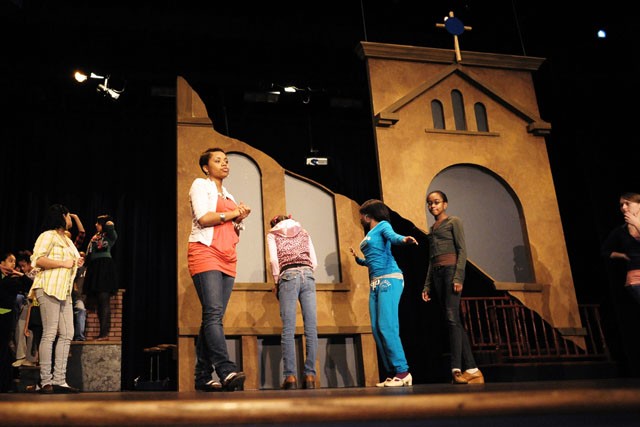People have been celebrating black history a lot longer than 35 years, and not just in the month of February. Triumphs were being immortalized, repression fought against and freedom sought in eras long before an American preacher told the nation that heâÄôd had a dream forthe future of his country.
Lou Bellamy, director of âÄúMa RaineyâÄôs Black BottomâÄù at the Guthrie Theater, advocates an enduring, all-encompassing appreciation of African-American history. His theatre company, Penumbra, epitomizes this approach already.
âÄúAs an African-American organization, we have these sorts of productions going on year-round,âÄù Bellamy said. âÄúOur history is something that is always important to us.âÄù
Jevetta Steel portrays Ma Rainey in the Penumbra production. Rainey travels nationwide belting the blues she grew up with in Virginia. The play follows the story of the real Ma Rainey that toured in the 1920s. The play, one of 10 written by Pulitzer Prize-winning August Wilson, examines the African-American struggle for integrity as musicians and individuals in the beginning of the 20th century.
âÄúMa Rainey, in bringing her music all over the country, is also bringing a kind of freedom to the people,âÄù Bellamy said.
Four decades after Ma RaineyâÄôs story began, four young girls were killed in a church in Birmingham, Ala. After the 16th Street Baptist Church bombing, the Civil Rights Movement was propelled far and above hushed contemplation. African-American history became more acutely observed with this and other events between 1963 and 1969.
Cearah Hamilton portrays one of the girls killed in the bombing, Carole Robertson, in the play, âÄúFour Little Girls: Birmingham 1963,âÄù currently at the SteppingStone Theatre in St. Paul. Despite the gravity of the bombing, Hamilton asserts that the lack of individual attention given to the victims made the event less affecting.
âÄúPeople just didnâÄôt know who these girls were. And I think teaching Americans about our history and this story is something that we need to do,âÄù Hamilton said. âÄúWe should be proud of what we fought for, and how hard we fought in our hearts.âÄù
Toward the end of the play, there is the inevitable and dreaded bombing. A bright flash bursts onto the stage, and then itâÄôs silent. Addie Mae CollinsâÄô little sister begins screaming forher, while the lights come up upon the four dead girls. They know then what the threatening caller saying âÄúthree minutesâÄù meant.
âÄúIt didnâÄôt need a big boom, it didnâÄôt need nothing crashing, nothing,âÄù Hamilton said. âÄúJust the silence itself is dramatic and lets sit in what just happened.âÄù
âÄúMa RaineyâÄôs Black BottomâÄù and âÄúFour Little Girls: Birmingham 1963âÄù are two of several events in the Twin Cities this month that commemorate black history. Other events include the NOMMO African-American Authors Series event with Gary Jackson and Yusef Komunyakaa, and âÄúAdrift on the Mississippi,âÄù presented by E.M. Pearson Theatre and Concordia University.
With the civil rights movement drastically adjusting the perception of African-Americans for a little more than 13 years, the foundation for a new era in their story was laid. The 1976 federal declaration of February as a month dedicated to African-American history was almost an afterthought. Of course African-American history was âÄî and is âÄî important. It had been there all along, simply waiting to be unveiled to the rest of us.














